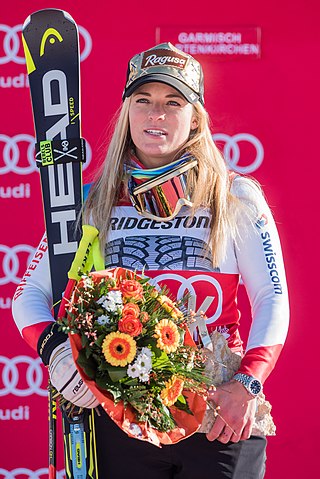
The International Ski Federation (FIS) Alpine Ski World Cup was the premier circuit for alpine skiing competition. The inaugural season launched in January 1967, and the 2018–19 season marks the 53rd consecutive year for the FIS World Cup.

The International Ski Federation (FIS) Alpine Ski World Cup, the premier circuit for alpine skiing competition, began in January 1967, and the 2019–20 season marked the 54th consecutive year for the FIS World Cup. As it had every year since 2006, the season began in Sölden, Austria in October. The season was supposed to end with the World Cup finals in March, which were to be held in Cortina d'Ampezzo, Italy for the first time since they began in 1993, but the finals were cancelled due to the COVID-19 outbreak in Italy.

The International Ski Federation (FIS) Alpine Ski World Cup was the premier circuit for alpine skiing competition. The inaugural season launched in January 1967, and the 2020–21 season marked the 55th consecutive year for the FIS World Cup. As it had every year since 2006, the season began in Sölden, Austria in October, and it ended with the World Cup finals in March, which were held in Lenzerheide, Switzerland. However, the COVID-19 pandemic forced many changes to the original racing schedule. Among them were the following:

The men's slalom in the 2021 FIS Alpine Skiing World Cup involved 11 events including the final, exactly as scheduled without any cancellations.

The women's downhill in the 2021 FIS Alpine Skiing World Cup consisted of seven events. The original schedule had called for eight downhills, but the World Cup finals race was canceled.

The women's super-G in the 2021 FIS Alpine Skiing World Cup consisted of 6 events, with one cancellation from the scheduled seven. Swiss skier Lara Gut-Behrami won four of the first five Super-Gs to establish an 195-point lead over Swiss teammate and defending discipline champion Corinne Suter with only two races to go, and she clinched the discipline title for 2021 after the sixth event, which turned out to be the last one for the season.

The men's downhill in the 2021 FIS Alpine Skiing World Cup consisted of seven events. The original schedule had contained nine downhills, but a rescheduled one on 5 March in Saalbach-Hinterglemm, Austria, was canceled due to fog and continual snowfall after just nine skiers had finished, and the downhill during World Cup finals week was also canceled.

The men's giant slalom in the 2021 FIS Alpine Skiing World Cup involved ten events, as scheduled.

The men's downhill in the 2020 FIS Alpine Skiing World Cup consisted of nine events, with only one cancellation from the scheduled ten.

The men's super-G in the 2020 FIS Alpine Skiing World Cup involved six events, as the last two scheduled Super-Gs were canceled.

The International Ski Federation (FIS) Alpine Ski World Cup was the premier circuit for alpine skiing competition. The inaugural season launched in January 1967, and the 2021–22 season marked the 56th consecutive year for the FIS World Cup.

The men's downhill in the 2022 FIS Alpine Skiing World Cup included eleven events including the final. A scheduled downhill on 5 December 2021 at Beaver Creek, Colorado was cancelled due to bad weather, but after several abortive attempts to run it at other venues, it was finally added to Kvitfjell on March 4, the day before the previously-scheduled race.

The men's giant slalom in the 2022 FIS Alpine Skiing World Cup consisted of eight events including the final. At the halfway point of the season, Marco Odermatt of Switzerland had opened a commanding lead in the discipline by winning four of the races and finishing second in the other. The remainder of the season was held in March, after the 2022 Winter Olympics, but in the first post-Olympic event, Odermatt clinched the crystal globe for the season championship.

The International Ski Federation (FIS) Alpine Ski World Cup was the premier circuit for alpine skiing competition. The inaugural season launched in January 1967, and the 2022–23 season marks the 57th consecutive year for the FIS World Cup.

The men's downhill in the 2023 FIS Alpine Skiing World Cup consisted of ten events, including the final. The season had been planned with fourteen downhills, but early in the season, two scheduled downhills on 29/30 October 2022 on the Matterhorn, running from Switzerland (Zermatt) into Italy (Cervinia), were canceled due to lack of snow and not rescheduled. Later in the season, a downhill scheduled for Garmisch-Partenkirchen on 28 January 2023 was also cancelled for lack of snow and not rescheduled. Finally, on 3 March, a scheduled downhill at Aspen was canceled due to poor visibility and deteriorating weather conditions, even though 24 racers had already started. The first out of the starting gate, Norway's Adrian Smiseth Sejersted, held the lead and was hoping for six more competitors to start so that the race would become official, but the weather conditions prevented that.

The men's super-G in the 2023 Alpine Skiing World Cup consisted of eight events, including the final. The season was originally planned with eight races, but two were cancelled early in the season and were not planned to be rescheduled. However, when two races planned at Garmisch-Partenkirchen on 28-29 January 2023 were cancelled due to a lack of snow, the two previously-cancelled Super-G races were rescheduled on those dates at Cortina d'Ampezzo, restoring the original Super-G schedule plan.

The men's giant slalom in the 2023 FIS Alpine Skiing World Cup consisted of ten events including the final. Defending discipline champion Marco Odermatt of Switzerland opened over a 100-point lead in the discipline by winning four of the first five races and finishing third in the other, although he then missed a race due to injury. Odermatt clinched the discipline championship by winning both giant slaloms on 11-12 March in Kranjska Gora, Slovenia.

The men's super-G in the 2019 FIS Alpine Skiing World Cup involved seven events. Italian skier Dominik Paris seized the lead in the discipline from Vincent Kriechmayr of Austria by winning the next-to-last Super-G of the season in Kvitfjell, then won the crystal globe for the season by also winning the final in Soldeu, Andorra.

The men's super-G in the 2017 Alpine Skiing World Cup involved six events, including the finals in Aspen, Colorado (USA). Although Norwegian skier Aleksander Aamodt Kilde was the defending champion in the discipline, fellow Norwegian Kjetil Jansrud won the first three Super-G races of the season. With only six events in the discipline, Jansrud then clinched the season championship before the finals merely by finishing seventh in the fifth Super-G of the year in Kvitfjell, Norway.

The men's super-G competition in the 2016 FIS Alpine Skiing World Cup involved eight events, including the finals in St. Moritz, Switzerland.













